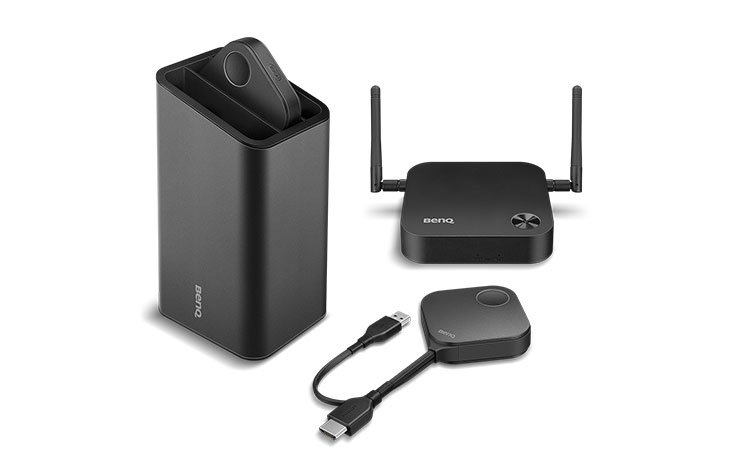Projector
Monitor
Lighting
Digital Display
Job References
This site uses cookies. By continuing to browse the site you are agreeing to our use of cookies, you can also manage preferences.
This site uses cookies. By continuing to browse the site you are agreeing to our use of cookies, you can also manage preferences.
Projector
Monitor
Lighting
Digital Display
Job References
Projector
Monitor
Lighting
Digital Display
Job References
Knowledge Center SupportIn today's connected environment, security breaches can come from unexpected places. In early 2019, Tenable found significant security flaws in multiple wireless presentation systems that exposed company networks to hackers – even denial of service attacks.
While using traditional HDMI cables is very secure, the cost of putting them through walls, ceilings, and floors is expensive. Solutions for wireless presentation that enable screen mirroring from your device to a display, on the other hand, offer the ability to have multiple presenters share the screen during a business meeting at a much lower cost. But if the system is not secure and opens the door to having your network hacked– it could be one of the most expensive “cost savings” ever.
There are three primary screen mirroring security risks that you should make sure to address when evaluating a wireless screen mirroring system for your business meeting and conference rooms:
Fortunately, there are also easy ways to mitigate these as well. Here are some best practices to address these risks and secure your wireless presentation.
Some screen mirroring and wireless presentation solutions are built around the corporate network transmitting data from a user’s notebook over the corporate or dedicated WiFi network to a network receiver attached to the display such as systems from Mersive Solstice, Airtame, Barco Clickshare. Others typically use a proprietary application loaded on the notebook – that tunnels through the network to find the correct receiver. One of the security flaws found was the possibility of having the administrator’s passwords being revealed. Combined with the increasing threats of network tunneling malware, protecting your network is becoming increasingly important. While administrators can offset this with the use of VLAN technology, it places an additional burden on the IT department to manage these extra networks – without eliminating the risk.
Look for a system that can operate independently of the network and operates without the need for proprietary software to reduce the risk of a hacker gaining access to your network via a wireless HDMI receiver or through cloned or rouge software apps.
For example, the InstaShow can enable Windows and Macbook screen mirroring in a corporate meeting room without any connection to the main network or having to load a screen mirroring app. The product creates a private network that encrypts and manages the content from a device to the receiver. For IT managers, they can utilize the corporate LAN to manage these devices – but users cannot bridge from the receiver to the corporate network.
Wireless Presentation System BenQ InstaShow

If you have ever worked on a sensitive project such as a new product launch, corporate reorganization, or salary review, you know how important it is to keep your information secure from prying eyes. When a presentation is wirelessly sent over a network, you need to ensure that only the people in the room can see the content. For example, some systems enable a remote view of the collaboration session by entering the receiver’s IP address into a web browser, while another popular entry-level system does not encrypt content sent over the network.
You also need to keep in mind that some inexpensive wireless casting systems like Miracast or Chromecast that may send your content over the web and back to your receiver. These types of risks can make security-conscious managers even more concerned about content leaks.
The best wireless HDMI screen mirroring systems encrypt the content before it ever goes to the display. For example, the InstaShow HDMI transmitter buttons turn red when first plugged into a notebook – then only enables a wireless transmission after it has confirmed its 128-bit AES encryption with the receiver. While other systems can encrypt the content – the InstaShow does it every time – so there is no risk of sensitive content being sent over an open network.
While IT managers carefully evaluate manufacturers of security-sensitive networking products such as routers and servers to ensure ongoing support, many companies who sell wireless HDMI systems are smaller companies who may be unable to resolve security threats on their products effectively. For example, of the 11 companies that were shown to have significant security threats on their products – only a few have updated their systems or software to address the issue. A number have either not responded or just discontinued the product without updating them. To make it more complicated, some manufacturers will only update the product for a limited timeframe – unless you pay a hefty annual subscription fee to ensure that the product is secure.
According to Futuresource , the BenQ InstaShow is the second best selling model sold under $1000 in Europe and Latin America – and a recognized worldwide leading brand in wireless presentation systems. As the #1 manufacturer of 4K projectors in the world – and a leading monitor and flat panel display manufacturer, the company is a solid and reliable choice with a proven track record of excellent customer support and service.
Thanks for your feedback!